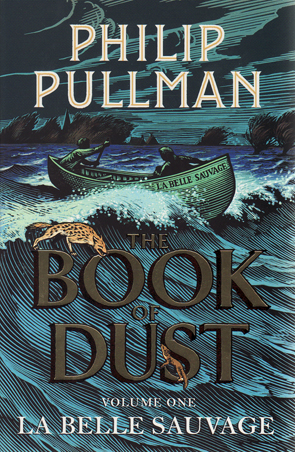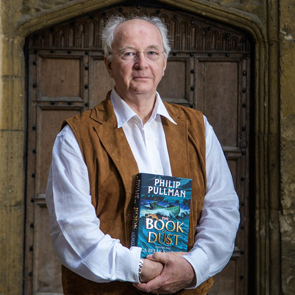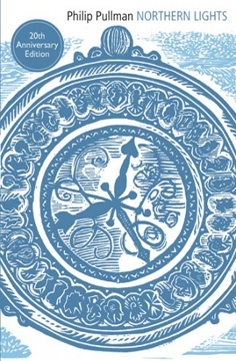This was interesting read, both as back story to what we know will come in Northern Lights, and as a good story in its own right, with Malcolm as a personable protagonist. It could easily be read by anyone who has never read the His Dark Materials trilogy, although if you have already read that you get the fun of encountering familiar characters. Basically, it is set 12 years before Northern Lights. Lyra, a 6 month old baby has been left with a kind order of nuns at a Priory outside Oxford. Malcolm Polstead is an 11 year old boy who lives with his parents at the Inn near the Priory. Malcolm is a friendly and inquisitive child who often helps the nuns with chores around the Priory. He meets the baby that has been placed in the nun’s care, and is instantly devoted to her. Through a strange chain of events he also becomes a spy. He realises that baby Lyra is in danger and has to act quickly to save her when her life is threatened. Just as one of her enemies (several different groups are after her) attempts to take her, a calamitous flood hits Oxford, destroying much of the town and surrounds. Malcolm and his friend, Alice, rescue Lyra then flee in his boat, La Belle Sauvage, to try to reach somewhere safe for her.
The broader story of this book documents the rise of the power of the Church. Although we are not given an exact timeframe, there are references to the former government which appears to have been fairly liberal. It has been succeeded by a more conservative government controlled by the church. The world is becoming oppressive, generally against scientific enquiry. Standard behaviours of fascist governments are appearing, with agents of the church interrogating whoever they wish with no one brave or foolish enough to cross them, and people vanishing without a trace.
Malcolm is an intelligent boy, interested in learning. He has dreams of higher education, and of perhaps becoming a scholar or an explorer. After coming into contact with Professor Hannah Relf of Oxford, one of his pleasures each week is choosing new books from her library to read, and then discussing them with her. He refuses to join the League of Alexander at school, and sees the group as sinister, and probably connected with the Consistorial Court of Discipline (a church group similar to the Inquisition). The aimof the league is to get children to report any transgressions or heresies in parents or teachers. It reminded me of a scene in 1984 where one of Winston's neighbours was reported by his children for speaking against Big Brother in his sleep. It is obvious that Malcom will not just accept the repression of the church. Becoming a spy for Professor Relf seems an obvious choice.
This book is set in the same universe as Northern Lights, but where that world seemed very different to our own, this time the world feels much more familiar and very like our own, just not quite the same era as we live in. An obvious example of this is the books Malcolm chooses to borrow from Professor Relf, such as Agatha Christie’s The Body in the Library or A Brief History of Time or The Silk Road. This can perhaps be explained by it being set around 12 years before Northern Lights, with those 12 years of church control setting back progress, and repressing scientific investigations like a mini version of the dark ages.
One of the first things I loved in the original trilogy was the idea of daemons, the animal shaped companion every human in this world has with them always, like an external soul. I fully accepted this aspect of the world, and even wondered what form my own daemon would take if I could get one, like Will manages to do in The Amber Spyglass. And because I accepted the rules about daemons that we gradually learn over the original trilogy, it was shocking in this book to encounter a character who didn’t follow them; who actually deliberately hits his daemon and abuses her. The reason for this isn’t something that is ever explained, unless we accept one character’s explanation that he must be mad. The man himself seems attractive at first, but no one warms to him after they see his daemon. Of course, whenever a daemon is hurt, their human also feels the pain. So in beating his daemon, Bonneville is also beating himself. So his actions become a form of self-flagellation, similar to the albino monk, Silas,in The daVinci Code. We know from his actions over the course of the book that Bonneville is monstrous, but the self-flagellation seems to suggest that he hates himself for his actions.
Although this book was fairly fast paced, some chapters near the end seemed to drag. I wasn’t sure where Pullman was going with a few of the scenes, such as with the fairy or the people in the underground garden. Perhaps the fairy incident is meant to impart something special to Lyra? Malcolm and Alice discuss this briefly, but then no more is said of it. It certainly helped them escape the underground garden, but as I didn’t see the reason for that scene either, I don’t think that much of the idea that information gained from one unnecessary encounter helped them escape another unnecessary encounter. Both scenes seemed to be just filler, to bulk out the story, rather than being important to the plot.
Of course I’m not the intended age group for this book. My youngest daughter is, and she has been waiting for me to finish reading it so that she can start it herself, after finishing His Dark Materials just a few days ago. Perhaps the fairy scene and the underground garden scene, and some of the other fantastical elements of the story, will have more appeal to her then they did for me.
But apart from this little quibble, I really enjoyed book. I thought it added background to the world of His Dark Materials and was a fun, fast-paced adventure story. It will be interesting to see what Pullman does with the second book in the series, due out sometime this year.
Note: Northern Lights is the title of Philip Pullman's first volume of His Dark Materials. It also known as The Golden Compass, the title under which it was published in North America.

 RSS Feed
RSS Feed Facebook
Facebook Instagram
Instagram YouTube
YouTube Subscribe to our Newsletter
Subscribe to our Newsletter




No one has commented yet. Be the first!